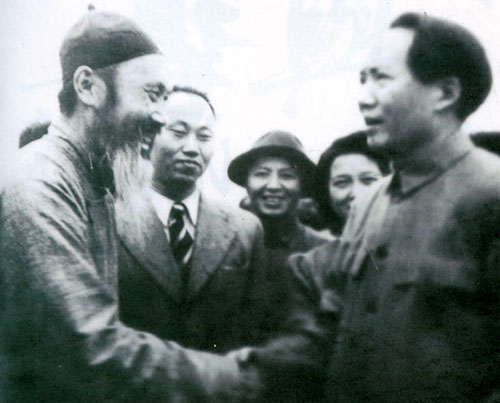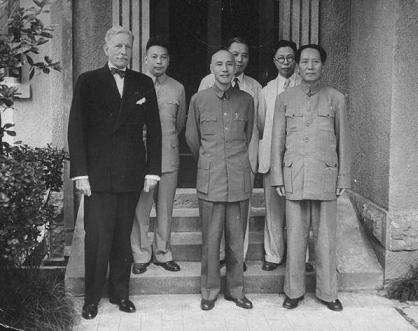Why and How the CPC Works in China
 0 Comment(s)
0 Comment(s) Print
Print E-mail
China.org.cn, October 27, 2011
E-mail
China.org.cn, October 27, 2011
Establishment of a multi-party coalition government
In the final phase of the Anti-Japanese War, what kind of a country should be built on the ruins of the war became the focus of Chinese politics. The CPC advocated the establishment of a democratic coalition government. On September 15, 1944 Lin Boqu, a delegate of the CPC, put forward the following proposal at the Third Plenary Session of the Third National Political Assembly: "We hope the KMT will put an immediate end to the situation of one-party rule. The National Government should convene representatives from the various parties, factions, anti-Japanese forces, local governments and people's organizations to hold a state conference and organize a coalition government formed of all the anti-Japanese parties." This was the first time the CPC had openly advocated the establishment of a coalition government, aimed at putting an end to the one-party autocracy of the KMT and implementing a multi-party system on the basis of democracy.
The CPC's idea of establishing a coalition government gained tremendous political support as soon as it was put forth, especially from the majority of the middle forces outside the CPC and KMT. On October 10 the most influential party among the middle forces, the China Democratic League, announced, "We should put an immediate end to the one-party dictatorship and establish a coalition government of various political parties." Clearly, the coalition government had become a common political aspiration of all parties except the KMT.
In fact, long before the CPC made its proposal for a coalition government, US President Roosevelt had proposed to Chiang Kai-shek during the Cairo Conference in 1943 that he should establish a coalition government with the CPC while the war was still raging. On November 7, 1944 Patrick Hurley, President Roosevelt's personal representative, went to Yan'an and held talks with the Chinese Communist leaders. The two sides reached a five-point agreement, of which the most important point was: "The present National Government is to be reorganized into a coalition National Government embracing representatives of all anti-Japanese parties and non-partisan political bodies.
A new democratic policy providing for reform in military, political, economic and cultural affairs shall be promulgated and made effective. At the same time the National Military Council is to be reorganized into the United National Military Council, consisting of representatives of all anti-Japanese armies." On November 10 Mao Zedong and Hurley signed the five-point agreement. Hurley also had a place reserved for the signature of Chiang Kai-shek.
However, the KMT's vision of the postwar political situation of China was completely different from that of the CPC. On September 3, 1945 the KMT issued "An Open Letter to the Compatriots of the Country," which did not give a positive response to the CPC's political proposal for establishing a coalition government, but rather focused on making specific proposals for the problems of postwar demobilization. As for the issue of democratic constitutionalism which was a cause of common concern throughout Chinese society, it only proposed a number of suggestions limited to local self-government.
In a radio address delivered the same day, Chiang Kai-shek stressed in particular that national unity was the only foundation of democratic constitutionalism, and to complete national reunification the only prerequisite was central government control of all the armed forces, meaning that the CPC should give up its control of armed forces. He was determined to maintain the KMT's one-party rule. As a result, in order to maintain the political status of the KMT's one-party autocracy, Chiang Kai-shek strongly opposed the CPC's coalition government suggestion, and thus the five-point agreement reached between Hurley and the CPC came to nothing.
In order to cope with public opinion both at home and abroad, the KMT then invited Chinese Communist leaders for negotiations. However, when Mao Zedong, leader of the CPC, went to Chongqing and, together with other democratic parties, reached a number of agreements, before the ink of the signatures was dry, ignoring public opinion at home and abroad, the KMT launched brutal military operations against Communist-controlled areas, resulting in the civil war, in which small battles developed inside Shanhaiguan Pass and large ones outside it.
On December 15, 1945 President Truman declared that a strong, united and democratic China was extremely important for world peace, as a divided China in turmoil would endanger the stability and peace of the world both then and in the future. The statement also demanded that the armies of both the CPC and the KMT stop the conflict, and hold a national conference of representatives of the major political forces. Meanwhile, Truman also sent General Marshall, former chairman of the US Joint Chiefs of Staff, as his special envoy to China to mediate between the CPC and the KMT.
Truman said explicitly that his sending Marshall to China was to try to prevent civil war and help the KMT and the CPC sign an agreement to organize a coalition government. Marshall said many times later that as an envoy to China, he had hoped to establish a bipartisan government system, and make the CPC, one of the minority oppositions, become one opposition with legal status. It could be seen that at that time the United States was still hoping that civil war could be avoided in China, and a coalition government established.
The CPC had a positive and welcoming attitude toward the mediation of the United States. On December 17, 1945 a spokesman for the CPC issued a statement, saying that the CPC welcomed the suggestions President Truman made on December 15th about his China policy that hostilities between the KMT, the CPC and other dissident armed forces be ceased; a meeting of representatives of all political parties be convened; the one-party dictatorship of the Kuomintang be ended; and the KMT government be restructured into a far-ranging representative government in which various parties had fair and effective representation so as to achieve a unified and democratic China.
On December 23, in the course of talks with Marshall, Zhou Enlai reaffirmed that the policy of the CPC was the same as that of the US, which was to resolve all the problems of the country by democratic means. President Truman's statement was very good. The CPC agreed to his proposals that a civil war be avoided in China; democratic politics be implemented; and a provisional democratic coalition government be established. As Chiang Kai-shek firmly opposed a coalition government, and Marshall's mediation also led nowhere, the US had to give up the mediation eventually, and sided with the KMT.
Thus, in the early period after the victory of the Anti-Japanese War, the blueprint for multi-party democracy that the CPC was making efforts to create was drowned by the rumble of guns. Later, John Leighton Stuart, a former US ambassador to China, remarked that the KMT's poor record showed that the one-party system should be abandoned. The only way for China's salvation was to achieve broad democracy and give the people human rights. However, the tremendous efforts made by the CPC for peace, democracy and unity awakened people of all walks of life in China, who saw through the nature of the KMT government. As a result, the common aspirations and financial resources of the majority of the people were brought together, and the foundation of the victory over the Kuomintang was consolidated.





